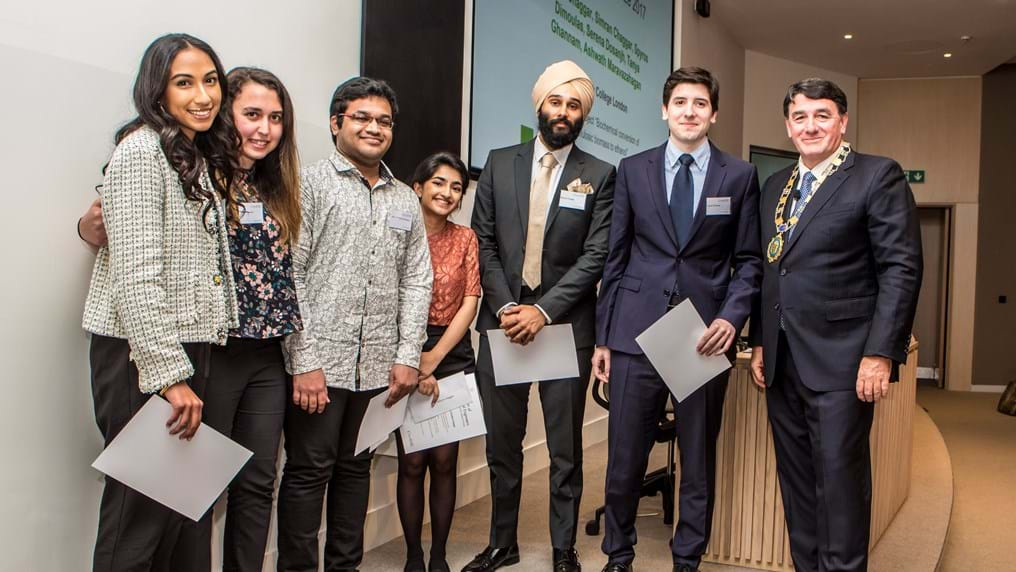Chemical engineers awarded top prizes for inspiring research and mentoring

22nd May 2018
The Institution of Chemical Engineers (IChemE) presented eleven chemical engineers with awards at its Annual General Meeting in London, UK, yesterday (Monday 21 May).
The Nicklin Medal was presented to Dr Kyra Sedransk Campbell, Imperial College London, UK, for her outstanding research in solid-liquid reaction engineering, as well as her work with young people. Sedransk is passionate about inspiring schoolchildren, particularly females, to consider studying science, technology engineering and maths (STEM) subjects.
Dr Eloy Sanz-Perez, Universidad Rey Juan Carlos, Spain, was also awarded the Nicklin Medal for continuing to impress with his knowledge, capacity of progress, enthusiasm for work, scientific criticism and capacity of communication.
Professor Robin Smith has spent more than 35 years as a leading authority on process integration. Smith was awarded the Sargent Medal for his research in this area, which led to the conceptual development of advanced process integration principles and methodologies. He is a Fellow of the Institution and is the author of the popular book Chemical Process Design and Integration.
The Ambassador Prize was awarded to Clementine Chambon for leveraging her research to bring clean energy access to some of the most energy-deprived communities in the world. Together with Indian entrepreneur Amit Saraogi, she launched Oorja – a social enterprise dedicated to providing renewable electricity to rural India. This IChemE accolade is the second for Chambon, who was awarded the Young Researcher Award at the 2017 IChemE Global Awards.
Chambon said: “I’ve always wanted to apply my engineering skills to climate change and development challenges. During my PhD I realised that my research could lead to immediate social and environmental impact through optimisation of biomass and solar mini-grids for last-mile energy distribution. Chemical engineering binds this all together. I’m truly humbled to receive the Ambassador Prize.”
For dedicating his time and effort to IChemE’s Professional Formation Forum and as a volunteer peer review assessor for IChemE membership, Richard Cousins was awarded the Council Medal. He was instrumental in developing the new IChemE Continuing Professional Development sampling process in order to meet new Engineering Council requirements.
The Macnab-Lacey Prize 2017 was awarded to Rhemet Chaggar, Simran Chaggar, Spyros Dimoulas, Serena Dosanjh, Tanya Ghannam, and Ashwath Manavazahagan, from University College London (pictured) for their design project Biochemical Conversion of Ligno-cellulosic Biomass to Ethanol. The entries from Manchester University and Monash University were highly commended.
The prize is presented annually by IChemE’s Sustainability Special Interest Group, to a team of undergraduate chemical engineering students submitting a design project that best shows how chemical engineering practice can contribute to a more sustainable world.
The winners of the Macnab-Lacey Prize winners will receive £750, partly funded from the Lacey Fund and partly by the Sustainability Subject Group who manage the award process. This year was the seventh year the competition has run.
Malcolm Wilkinson, Chair of the Sustainability Special Interest Group, commented that the Award has been instrumental in teaching undergraduates the application of sustainability principles into real world design decisions.
As his last official duty as IChemE President, John McGagh, Chief Digital Officer at Snowy Hydro, awarded the medals at IChemE’s 2018 Annual General Meeting held at the Institution of Engineering and Technology in London, UK.
He said: “Congratulations to all the winners of today’s medals and prizes. I’m delighted to be presenting these awards for the outstanding work that all of you do day-in day-out.
“Not only is your research progressing the profession, but by sharing that knowledge and inspiring others currently studying it, you are shaping the future professionals to take chemical engineering forward. All of your efforts are contributing to advance chemical engineering and provide a truly positive impact on our communities.”